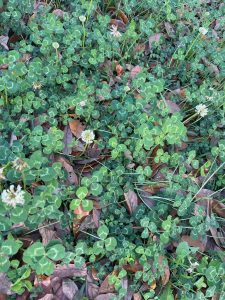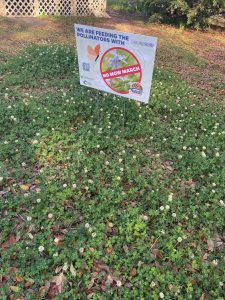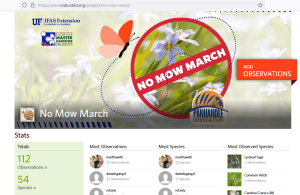
Bugs love weeds. This combination is likely the bane of most homeowners—the stereotypical lawn is typically bug-free and a bright green monoculture of one turf species. But when it comes to the health of the ecosystem, bugs and weeds are tremendous contributors. Native insect pollinators thrive on the pollen of low-growing grasses, herbs, and wildflowers.

According to a study conducted by the USDA Forest Service, reducing frequency of mowing can improve both diversity and abundance of bee species. During the study, typical home lawns were mowed at intervals ranging from weekly, every two weeks, and every three weeks. After analyzing the data collected over two summers, they found that species diversity was highest among those lawns cut every three weeks. However, the bigger numbers (abundance) of bees were seen in those cut every two weeks. This frequency seemed to provide “plenty of lawn flowers combined with shorter grass that made access to lawn flowers easier.” Through the study timeframe, they counted over 100 species of bees, equal to 25% of all species known in the region. Based on this research, the USDA encourages a reduction in mowing to help provide habitat and nourishment for bee populations.

In support of these findings, Extension horticulture faculty created “No Mow March.” March is the kickoff to spring, the season of warming temperatures, brilliant flowers, and newborn wildlife scampering around. This effort encourages residents to keep all or part of their landscapes a little wilder. Not mowing allows low-growing plants to produce blooms, pollen, and nectar, allowing pollinator insects and birds to feed and distribute pollen widely. To share findings and create a like-minded community, they have created an iNaturalist site to post photos, locations, and plant/insect identification. iNaturalist is a free app and website used around the world by scientists and outdoor enthusiasts to share information about habitats and wildlife.
Several Extension events are being held throughout northwest Florida to encourage pollinator-friendly landscaping this month.
In Escambia County, our horticulture and Master Gardener programs will be celebrating “No Mow March” by holding a Pollinator Festival this Saturday, March 23. The festival, located at the Escambia County Extension Office and Demonstration Garden (3740 Stefani Road, Cantonment), will include speakers and exhibits. At 9 am, Emily Peterson will give a presentation on “Artfully Adding Pollinator Plants to Your Landscape.” Seating is first come, first served. From 10 am-Noon, exhibitors, including the Pensacola Federation of Garden Clubs, Escarosa Beekeepers, the Longleaf Chapter of the Native Plant Society, and ECUA, will be set up around the garden with information. A small Master Gardner plant sale will also take place.
If you want to take part in “Now Mow March” this spring, let us know! You can take the pledge here.
 7
7
